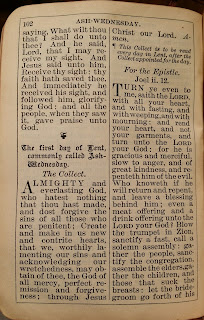The First Day of Lent: "who hatest nothing that thou hast made"
In order to the preventing any false or mean Apprehensions of the Divine Nature, when the Passions of Mankind are attributed to it, we must consider these two things;
(1.) That we must by no means attribute to God any thing that is unreasonable in our Selves; such are all irregular Motions, which we call violent Passions, arising from Surprise, Mistake, Inadvertency, Weakness, or corrupt Inclination. But setting all these aside, the Original Passions of Mankind, which are agreeable to Reason, are no other than what arise from an Inclination to what we judge to be Good, and an Aversion from what we apprehend to be Evil; which holds as to the Divine Nature.
(2.) That there is an observable Difference in the very Nature of some Passions, which imply a Repugnancy in themselves to the Divine Perfections, which others do not. For Love and Kindness, and Joy, and Inward Satisfaction have nothing in them supposing their Object Good, but what agrees with the Divine Nature; but the Passions contrary to these, as Envy, Ill-will and Revenge are not onely Repugnant as Passions, but in their own Nature; for God cannot Envy the Good of his Creatures, nor bear Ill-will to them as such, nor take Pleasure in their Torments. And of this Nature Anger properly taken is, as it doth imply a present Disorder and Disturbance within, from the Apprehension of some Injury done or intended, with a Desire of Revenge on those who doe it; all which is inconsistent with the necessary Perfections of God; for they argue Meanness, Imperfection and Mutability.
We must therefore fix on such a Notion of Anger as becomes the Almighty Wisdom and Goodness; and that lies in,
(1.) A Displeasure against the Sinner on the account of his Sins; For God cannot have any Complacency in those who displease him, as all Sinners do, whether they design it or not.
(2.) A Will to Punish Sinners according to their demerits; which being according to the Rules of Wisdom and Righteous Government, cannot be said to argue an indecent Passion.
(3.) The Actual Execution of his Justice upon great Provocations. And so God is said to be angry when he punishes; especially when he doeth it suddenly and severely; As Men in their Passion are wont to doe. But whatever God doeth in this kind, he doth it with the Wisdom and Temper of a Judge, and not with the Fury or Passion of an Angry Being.
And there is nothing in all this unbecoming the Divine Nature, but very agreeable thereto. And this is all which in strictness of Reason is understood by God's being Angry with Mankind. For we must never imagine that God acts according to sudden heats and Passions; but whatever he doth is according to the Counsels of Infinite Wisdom and Goodness.
I do not deny that the Scripture doth represent Anger in God as if it were a Passion raised upon great Provocation, and capable of being laid by Submission and true Repentance. Thence we read, of God's Wrath waxing hot, of his Anger kindling against his People, and his turning away from his fierce Anger, and many such Expressions; but so we read of the Fire of his Indignation, the Sword of his Wrath, the Stretching forth of his Hand; which all grant are not to be literally understood. If then in these Expressions, the Perfections of the Divine Nature are to be our Rule, according to which we must interpret them, because the literal sense implies an incongruity to the Divine Perfections which are all wholly Spiritual; then from the same Reason we must remove all Perturbations from it which are as inconsistent with the absolute Perfection of it, as Eyes and Ears and Hands and Feet are, although they are all mention'd in Scripture.




Comments
Post a Comment